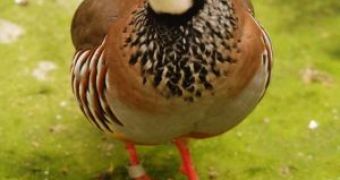Scientists have linked high testosterone levels in male birds to high level of carotenoids, the pigments that give the bright red/yellow/orange color on birds' feathers, beaks, and legs.
Glossy colors warn about sexual fitness and health, indicating to females that the male is a potential healthy right mate. More testosterone induces more vigorous courtship (including more elaborate singing) and more vigor in male combat for females, crucial factors on male reproductive exit.
Until now, the link between bird coloring and testosterone has passed unnoticed by biologists. The researchers increased the testosterone level of male red-legged partridges, a species from Western Europe, during the mating season and saw a 20 % increase in carotenoids, achieved by the birds from plant food, in their blood and livers. "A bird in good shape should be colorful and also should sing more," said Julio Blas, a biologist at the University of Saskatchewan in Saskatoon, Canada. "What we did is connect these two lines of research."
But high levels of testosterone usually depress the immune system, rendering the animals vulnerable to disease. But the birds with increased testosterone levels did not present weakening of the immune systems. "The link between testosterone and carotenoids may be the answer," Blas says.
Carotenoids are precursors of vitamin A, a strong antioxidant, which eases the organism's fight against harmful free radicals. This way, they strengthen the organism, compensating the testosterone's effects. In fact, ill males have dull plumage. "This is probably because the carotenoids are being used by the struggling bird's immune system in an effort to fight off disease," Blas says. "When a chicken becomes sick, its yellow legs become paler, because it is using its carotenoids to fight illness."
Good fitness means a high testosterone level, a strong immune system, and high amounts of carotenoids in their legs, beaks, and feathers. "It may be that only the really high-quality individuals can withstand the immunosuppressive effect of testosterone," said Lynn Siefferman, a biologist at Indiana University in Bloomington. "The idea is that they will put health before reproduction", she said. "A similar mechanism is probably at work in other vertebrates," Blas says.
By now, the researchers can only guess that testosterone may mobilize the carotenoids from the body's deposits into the blood or may improve carotenoids digestion. Or caretenoids may provoke an increased appetite for carotenoids rich food items.
Studies made on finches and blackbirds showed that after molt, during the feather regrowth, the birds shift their diet to a more carotenoid rich diet, to a degree that their fat turns red.

 14 DAY TRIAL //
14 DAY TRIAL //